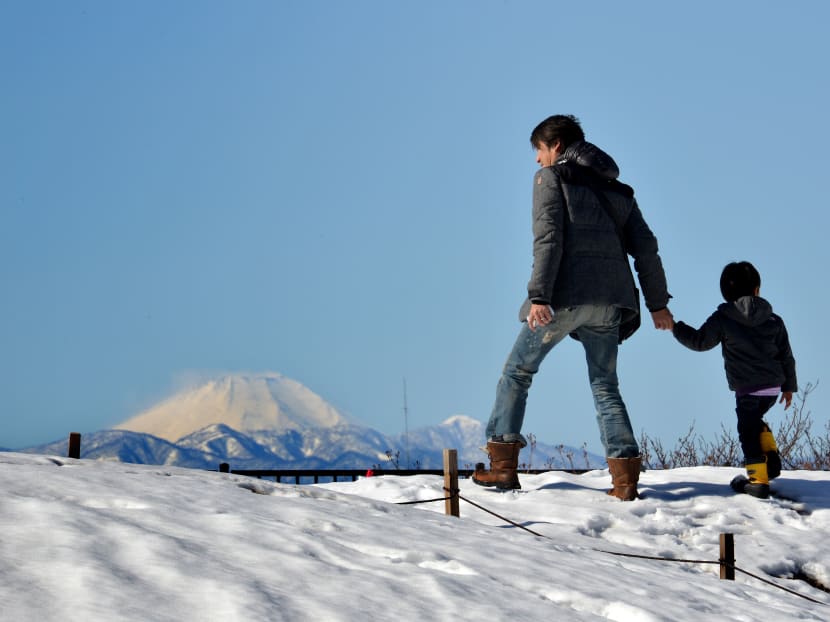More Japanese men putting family first after becoming first-time fathers in their 50s or older
TOKYO — The number of first-time fathers in their 50s or older is rising in Japan, as the average age of marriage creeps up.

A father walking with his son in a snow-covered field in Tokyo. The average age at which men become a father in Japan has been rising every year in Japan, standing at 32.7 years in 2015, said a survey conducted by the Ministry of Health, Labour and Welfare.
Photo: AFP
TOKYO — The number of first-time fathers in their 50s or older is rising in Japan, as the average age of marriage creeps up.
There were 3,357 men who had their first child in their 50s in 2015, compared with 1,121 in 1995, according to government figures. The number of first-time fathers in their 60s also shot up during the period, increasingly almost three-fold from 95 to 292.
Meanwhile, the average age at which men become a father has been rising every year in Japan, standing at 32.7 years in 2015, said a survey conducted by the Ministry of Health, Labour and Welfare.
The Japanese are also marrying later. The average age of men getting married for the first time came to 30.7 years in 2015, the highest on record, while that of women was 29.0 years, tying the record marked the previous year, according to the ministry.
One older father interviewed said he can feel exhausted quickly after playing with his kids, and he and his partner often worry about their age, health, and post-retirement earnings. But, on the positive side, they say they can devote more time to their children than when they were younger.
Take Professor Makoto Arakaki for example. The 51-year-old, who teaches at Okinawa Christian University in the south-western Japanese prefecture, has a two-year-old daughter, An. Since his wife, 33, a junior high school teacher, leaves home before 7am for work, it is his task to wake up and make breakfast for An.
“It’s quite exhausting,” said Prof Arakaki while taking her to a daycare centre in the scorching summer heat.
Other than getting tired easily, he is gripped by a sea of worries. “Do other parents take me to be her grandpa?” he wondered. “Can I stay in good shape when taking part in her school athletic meet? Can I make enough money to support her education? And can I live long enough to attend her wedding?”
The mandatory retirement age at his university is set at 65, but he hopes to work longer.
Prof Arakaki had married late, choosing to stay single to focus on his research in international relations. When An was born, however, Prof Arakaki decided to put her first.
“Things would have been different if I were younger,” he said. “I couldn’t have devoted myself to child-rearing. Now that I gained some experience, I can give my all to An.”
Another example is Prof Katsuhiko Hirasawa, 59, who became a father when he was 50. Prof Hirasawa, an expert in business administration at Nihon University in Tokyo, said he was able to stay relatively calm when he had his first child, since he had heard from friends what it would be like to raise children.
Meanwhile, a 60-year-old design consultant, the father of a nine-year-old girl, said: “I can’t be strict with my daughter and I may be spoiling her.”
Prof Yasushi Oyabu, an expert in developmental psychology at Waseda University in Tokyo, said there is a positive side to late-life fatherhood. Generally speaking, older fathers can apply the expertise they have acquired at companies through the supervising and development of young workers to child-rearing, he said.
Mr Tetsuya Ando, head of Fathering Japan, a non-profit organisation supporting child-rearing fathers, observed that older fathers can “spend more time with their families than when they were young, as they have discretion in work”. KYODO NEWS






